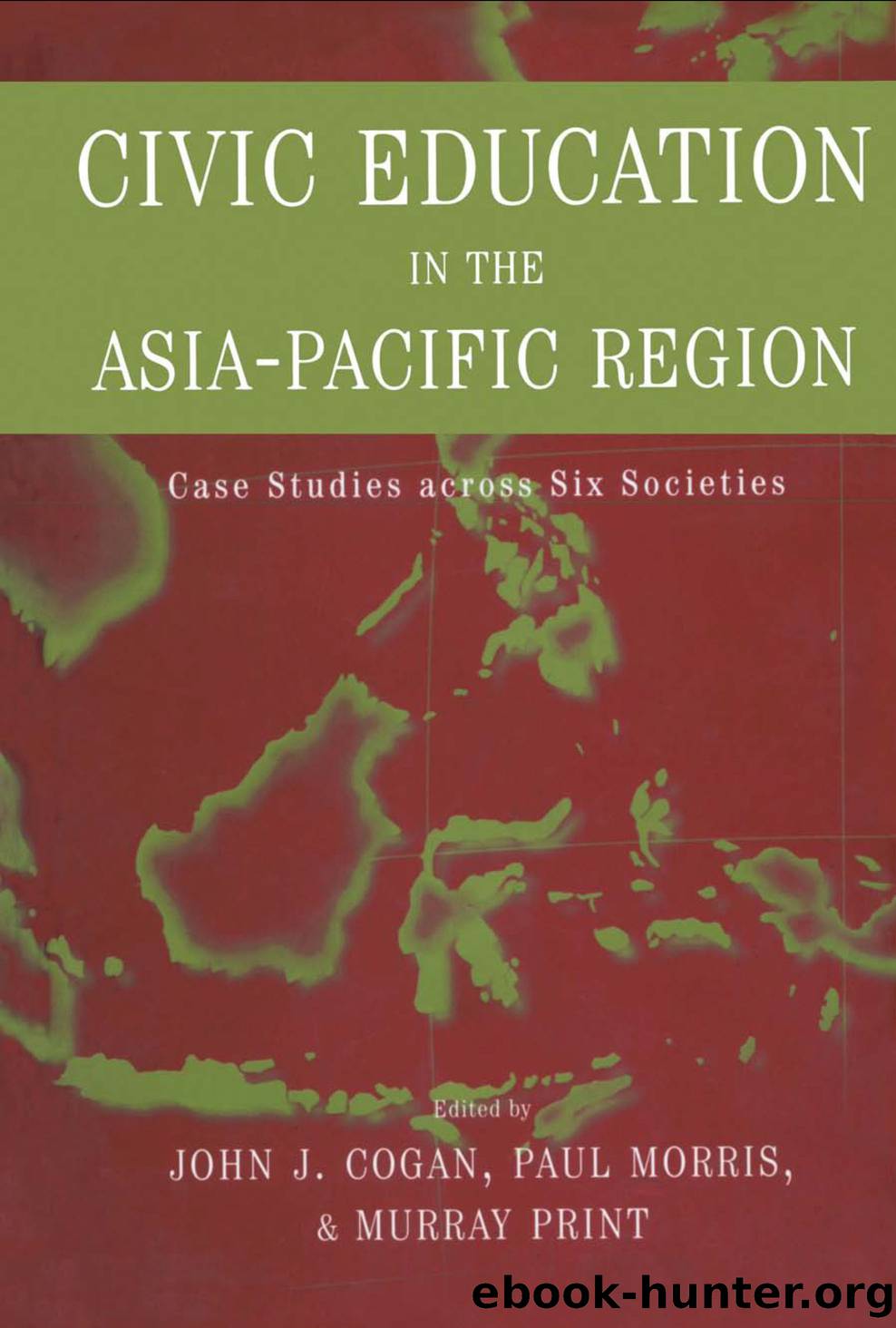Civic Education in the Asia-Pacific Region by Cogan John L.;Print Murray;Print Murray;

Author:Cogan, John L.;Print, Murray;Print, Murray;
Language: eng
Format: epub
Publisher: Taylor & Francis Group
Published: 2002-08-15T00:00:00+00:00
The Comparison of Values Promoted in the Traditional and New Civic Curriculum
In a previous study, I applied content analysis in exploring the values promoted through the civics curriculum at the junior high school level (Liu, 2000). I used eight categories of value clusters as the framework for analysis, namely, self-cultivation, family values, democratic values, civic life and community, economic life, fair government, national identity, and social cohesion/diversity. The findings were as follows.
First, social cohesion was emphasized in the traditional period of civic education, whereas social diversity was emphasized in the new period. The traditional curriculum was blind to individual and group differences and it recognized only mainstream culture to enforce homogeneity of citizens within the state. Social diversity was ignored and collectivism was emphasized in the civic curriculum. However, because of the influence of multiculturalism from Western societies, minority groups have been empowered to raise their consciousness and to voice their needs. The new civic education recognizes that it is a trend to infuse social diversity and multicultural issues into the curriculum. However, there is still tension between the liberal and conservative educators because the latter are afraid that stressing social diversity and minority rights too much might influence uniformity. Thus, the new civic education attempts to seek a balance and consensus between diverse views, such as individual versus society, freedom versus order, diversity versus uniformity, and identification versus criticism.
Second, democratic values were emphasized in both the traditional and new periods, but they had different meanings in each period. The democratic values promoted in the traditional period were used as a means to distinguish democratic Taiwan from totalitarian Communist China. The curriculum implied that Taiwan was more democratic than China. Civic education focused on the basic rights and freedoms of the individual that Taiwanese were said to possess. In the new period, civic education concentrates more on the essence of democracy, such as participation in the democratic process, the right of dissent, checks and balances, and democratic decision making.
Third, self-cultivation was emphasized more in the traditional period than in the new period. Self-cultivation, as promoted in civics, was related to the development of moral dispositions and behaviors. Confucianism has played a major role in the practice of civic education in Taiwan. Therefore, the values emphasized in traditional civic education were, to a large extent, directed by Confucianismâs central ideals that stress the virtues of humanity, filial piety, benevolence, and proper social relations.
Fourth, national identity was stressed as a fundamental value in the traditional period, but has been promoted less in the new period. Because of the long-term tension between Taiwan and China, and the fear of attack from Communist China across the Taiwan Straits, traditional civic education emphasized the three principles of people, anticommunist ideology, national symbols, and respect for the government and its authority. Students were encouraged to appreciate Chinese culture and be proud of being Chinese. During the traditional period, students were indoctrinated that good citizens should prepare to sacrifice themselves for the state when necessary. In the
Download
This site does not store any files on its server. We only index and link to content provided by other sites. Please contact the content providers to delete copyright contents if any and email us, we'll remove relevant links or contents immediately.
The Art of Coaching Workbook by Elena Aguilar(51161)
Trainspotting by Irvine Welsh(21643)
Twilight of the Idols With the Antichrist and Ecce Homo by Friedrich Nietzsche(18622)
Fangirl by Rainbow Rowell(9229)
Periodization Training for Sports by Tudor Bompa(8253)
Change Your Questions, Change Your Life by Marilee Adams(7759)
This Is How You Lose Her by Junot Diaz(6877)
Asking the Right Questions: A Guide to Critical Thinking by M. Neil Browne & Stuart M. Keeley(5759)
Grit by Angela Duckworth(5604)
Red Sparrow by Jason Matthews(5467)
Paper Towns by Green John(5179)
Room 212 by Kate Stewart(5105)
Ken Follett - World without end by Ken Follett(4723)
Housekeeping by Marilynne Robinson(4436)
The Sports Rules Book by Human Kinetics(4379)
Papillon (English) by Henri Charrière(4262)
Double Down (Diary of a Wimpy Kid Book 11) by Jeff Kinney(4261)
The Motorcycle Diaries by Ernesto Che Guevara(4089)
Exercise Technique Manual for Resistance Training by National Strength & Conditioning Association(4061)
